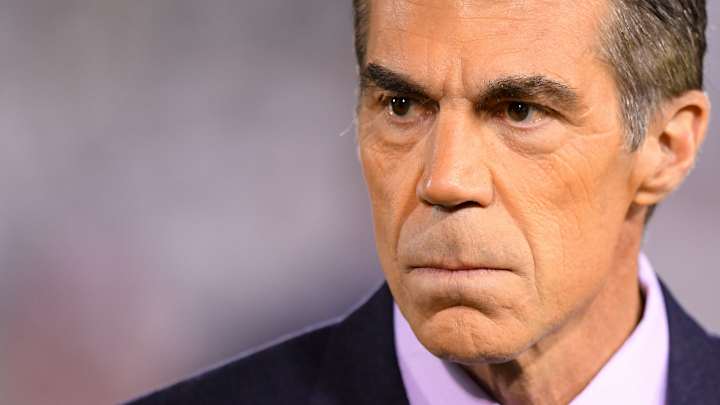A College Football Season In Spring 2021? Chris Fowler Cites Unnamed Sources Telling Him It Is Possible

In a seven-minute discussion speech on Instagram, ESPN play-by-play broadcaster Chris Fowler laid out what he’s being told are the three scenarios to having college football during the 2020-21 academic year.
Fowler, who replaced Brent Musburger as the play-by-play announcer for Saturday Night Football on ABC, alongside analyst Kirk Herbstreit, mirrored his ABC colleague that there are “severe challenges” to starting college football on time in August.
“Hope isn’t a strategy unless you’ve got truth and facts, right? We’ve already seen that,” Fowler said on the Dan Patrick Show Monday. “What’s realistic? And I don’t know if it’s really realistic to gather in 20 Saturdays and have a national season. You could have a lot of colleges online exclusively this summer. The campuses won’t even be open. So how can you bring this unpaid workforce back in there and say ‘Hey, we’re playing games’ without a bunch of people going ‘Wait, why are playing? What are we doing?”
During a radio interview with ESPN’s Paul Finebaum, Herbstreit was asked about the prospects of teams taking the fall this season. According to the ESPN television personality, he would be “shocked” if it happened.
“I’ll be shocked if we have NFL football this fall, if we have college football. I’ll be so surprised if that happens,” Herbstreit said via TMZ.com.
In the Instagram video, Fowler laid out the three scenarios positioning the 2020 college football season to be played as scheduled, to be started in November with a reduced schedule and postseason, or to be pushed back all the way to February and to finish in June. That third scenario, Fowler says according to what he’s calling “informed speculation” of the power brokers with college athletics and college football, that the final option of having a spring season of college football is “gaining momentum” among “a lot of reasonable people” and might emerge as the “most prudent course of action.”
Dr. Anthony Fauci, one of the nation's most acclaimed doctors in charge of leading the United State’s response to the coronavirus pandemic, said sports returning without fans remains a possibility.
"There's a way of doing that," Fauci said on Snapchat's show "Good Luck America" when asked if there was going to be a college football season in 2020. "Nobody comes to the stadiums. Put (athletes) in big hotels, wherever you want to play. Keep them very well-surveilled, but have them tested like every week and make sure they don't wind up infecting each other or their families and just let them play the season out."
According to analysis analysis of NCAA schools’ financial reports by USA Today Sports and a report by Steve Berkowitz, the money implication at stake of possibly canceling the 2020 college football season is at least $4.1 billion in fiscal-year revenue for the athletics departments at just the 50-plus public schools in the Power Five conferences — an average of more than $78 million per school. In layman's terms, Illinois athletics director Josh Whitman is contemplating the potential of dealing with somewhere in the financial neighborhood of a $78 million deficit to his budget that, according to USA Today, had a revenue of $115,132,186 for the 2018-19 academic year.
“I think I talked about prioritizing questions,” Whitman said on March 13. “We know that's a big question that we know will need to be answered, but it's not one that we've been able to dive deeply into yet. Certainly, there will be financial implications of these decisions, but in terms of the magnitude and scale, I don't have a good sense yet.”
On The Dan Patrick Show, Fowler raised a legitimate concern of having football student-athletes return to school to practice and play games when the university administration hasn’t deemed the campuses safe and healthy for students to inhabit and take in-person classes.
“You have to have perception and a sense of priorities,” Fowler said. “These are not pro athletes. If your campus is closed and said we’re not ready to have students back but football players, get your butts back here, we’re going to put you in quarantine, we’ll take your temperature everyday (and) you’re going to perform so we can get this cash cow flowing again, wait a minute. Don’t you think a lot of players will say ‘wait a minute, you’re deciding a public health issue for us when everybody else is operating on different rules.”
